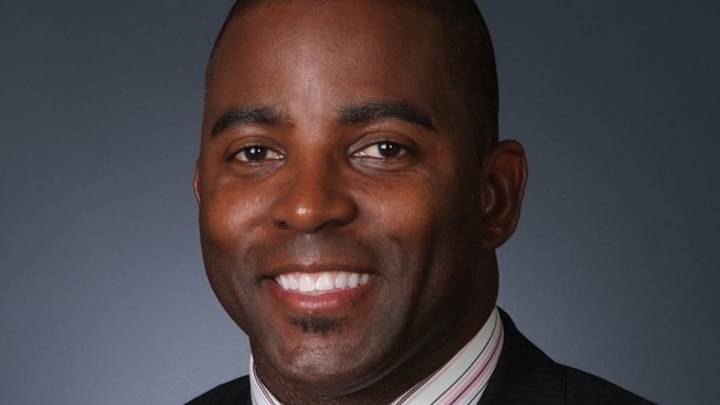Hughes Doesn't Want Discussion To Go Away

Danan Hughes was doing an interview while he was driving recently when he noticed he was being followed by a police car.
Hughes, speaking on the Missouri Valley Football Conference's YouTube video "A Conversation About Race And Social Justice on Wednesday, said the officer followed him for five miles.
"And I could tell through the rear-view mirror that he was running my information," the former Iowa wide receiver and baseball player said. "And I'm sitting in talking on my speaker in the car, about this same topic, and it jolted me, you know? I lost track of my thoughts, I lost track of the points I wanted to make on the radio.
"And that's the norm."
Hughes, who played at Iowa from 1989-92 under coach Hayden Fry and then went on to play in the NFL, said he has had numerous experiences of being pulled over for, as he said, "driving while black."
"I grew up five minutes from New York City," he said. "And then I went out to the cornfields of Iowa, and now I'm down here in Kansas City. So I've been in the Midwest for, you know, almost 30 years now, or more than 30 years, and I've seen police officers make dead U-turns to pull me over. Just because we caught eye contact, not because I was speeding. Not because of tail light was out, or what have you."
It's why, Hughes said, he has had conversations with his sons on what to do if they're pulled over by a police officer.
"I often ask some of my friends, white buddies around people golf with, hang out with, you know. 'What do you tell your kids when they interact with the cops?'" Hughes said. "You know most of it is, 'Just be respectful. Don't be a jerk,' general stuff like that. I say, 'You want to hear the laundry list of things that I tell my kid, my son, as you're getting pulled over?'
"Turn the lights on in the car, put your phone on 'record.' Get all your ID out as you're still driving. Make sure your seat belt is attached, even if you got to reach for your wallet, while your seat belt's attached. Keep it attached, have all your information out on the dashboard, hands on the steering wheel at 10 and 2. I have a 28-year-old and a 24-year-old. And they've been they've known that since they were 16 years old. That's, that's a difference. When people talk about white privilege, it's not about growing up better with a silver spoon or not. It's about not having to have that kind of conversation. "
Hughes, now a TV analyst on the conference's network, mentioned the current situation at Iowa, where former players have alleged racial disparities within the football program.
"We're seeing things now in the news with the University of Iowa and some alumni that are there, so they have gone through different things as well," Hughes said. "So, this is, this is not new. This is, this has been around for decades and centuries, and I've experienced it from every angle. The looks, the assumptions. The quick stance in regards to feeling like a threat, like, a police officer speaking to me and feeling like he's immediately in a threatening position. And that just creates a lot of anxiety and angst."
Hughes said the protests in recent weeks after the death of George Floyd have brought attention to racial issues, but that is something that can't go away.
"We've seen it at Iowa, we're seeing it on campuses all over, we're seeing with with leaders, you know, when the time to shut up is no longer gonna be a place, and we have to make those adjustments and the first thing would be about listening," Hughes said. "It's got to be about listening and hearing everybody, and I'm encouraged that that's happening now.
"When we have protests that we're having now and marches and everybody's participating, I want to see what happens next week, I want to see what happens next month. These people that are organizing all these different things is great for now, very necessary for now. But let me see what you're doing next year. What have you implemented in your program that is going to have staying power to enforce what you're what you're trying to enforce."

I was with The Hawk Eye (Burlington, Iowa) for 28 years, the last 19-plus as sports editor. I've covered Iowa basketball for the last 27 years, Iowa football for the last six seasons. I'm a 17-time APSE top-10 winner, with seven United States Basketball Writers Association writing awards and one Football Writers Association of America award (game story, 1st place, 2017).
Follow johnbohnenkamp